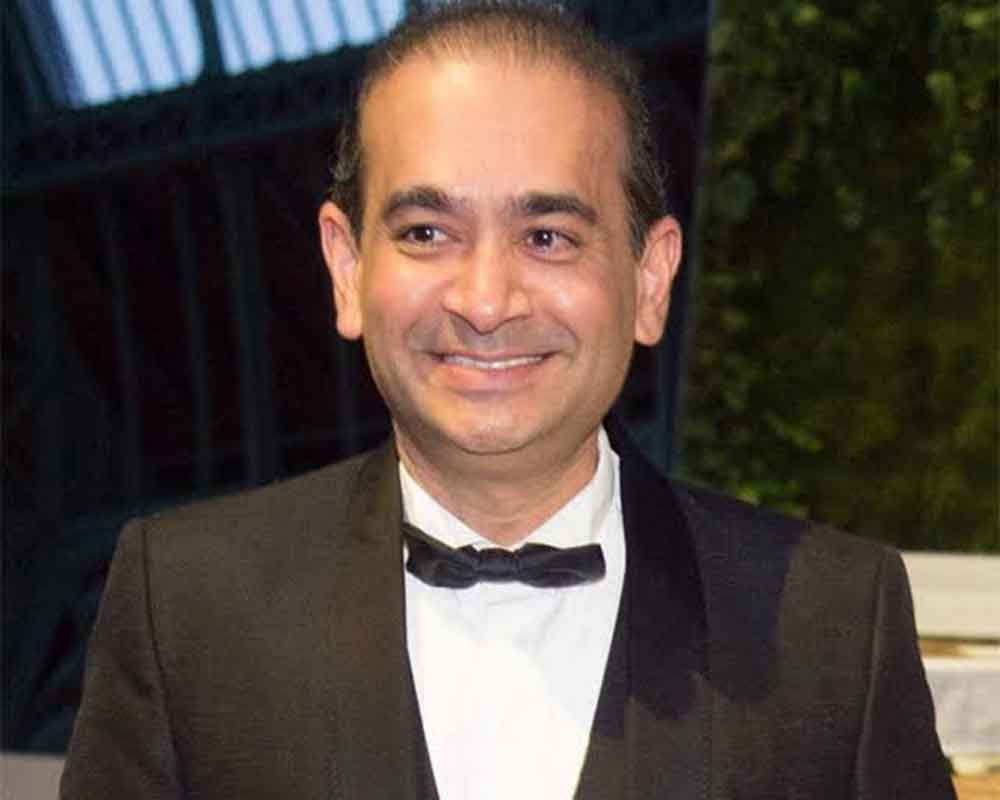Nirav Modi moves bail application for the fifth claiming 'anxiety', 'depression'
Wed 30 Oct 2019, 16:37:36

London: Fugitive diamond merchant Nirav Modi, wanted in India in connection with the nearly USD 2 billion PNB fraud and money laundering case, has moved a new bail plea against his continued detention in a London prison cell.
The 48-year-old, who is fighting extradition to India, has reportedly sighted anxiety and depression in the latest application, his fifth attempt at bail since arrest on an extradition warrant in March this year.
His new application will be heard at Westminster Magistrates' Court in London on November 6, a court official said on Wednesday.
Modi is likely to appear via videolink or may even be produced in person if the court listings officials deem that necessary.
His legal team has previously also sighted the "severe" conditions in Wandsworth prison in London, one of England's most overcrowded jails, in their bail attempts.
The diamond merchant's troubled state of mind was laid out before in "confidential" documents before the UK High Court during his bail appeal earlier this year, which were not disclosed due to a court order.
"The circumstances he has had to endure at Wandsworth have been personally difficult and the confidential exhibits reflect the experience that has marked him deeply," said his barrister Clare Montgomery, during a hearing at the Royal Courts of Justice in London in June.
"The reality is that he is not the cold-blooded hardened criminal as claimed by the government of India but a jewellery designer from a long line of diamond dealers, and regarded as being honest, careful and reliable," she said, adding that a number of individuals were willing to offer sureties and substantial sums to back up the
claim that Modi is not a man who plans to run.
claim that Modi is not a man who plans to run.
But in her judgment, Justice Ingrid Simler had concluded there were "substantial grounds" to believe that Modi would fail to surrender as he does possess the means to "abscond".
Reiterating similar concerns as those previously raised by Westminster Magistrates' Court during earlier bail attempts, Judge Simler ruled that after considering all the material "carefully", she had found strong evidence to suggest there had been interference with witnesses and destruction of evidence in the case and concluded it can still occur.
However, there are no strict limits on the number of times Modi can apply for bail, and another application will now be heard next week. He was scheduled to appear via videolink from his jail for a regular remand hearing at Westminster Magistrates' Court on November 11, a date that still remains on the court's lists.
At a hearing earlier this month, Judge Nina Tempia had confirmed that his extradition trial is scheduled between May 11 and 15 next year and that he must re-appear via videolink every 28 days for "call-over hearings" until the case management for the trial kicks in from February next year.
Modi has been lodged at Wandsworth prison in south-west London since his arrest on March 19 on an extradition warrant executed by Scotland Yard on charges brought by the Indian government, being represented by the UK's Crown Prosecution Service (CPS) in court.
During subsequent hearings, Westminster Magistrates' Court was told that Modi was the "principal beneficiary" of the fraudulent issuance of letters of undertaking (LoUs) as part of a conspiracy to defraud PNB and then laundering the proceeds of crime.
No Comments For This Post, Be first to write a Comment.
Most viewed from International
Most viewed from World
AIMIM News
Latest Urdu News
Most Viewed
May 26, 2020
Do you think Canada-India relations will improve under New PM Mark Carney?
Latest Videos View All
Like Us
Home
About Us
Advertise With Us
All Polls
Epaper Archives
Privacy Policy
Contact Us
Download Etemaad App
© 2025 Etemaad Daily News, All Rights Reserved.

.jpg)
.jpg)
.jpg)






.jpg)


.jpg)
.jpg)
.jpg)
.jpg)
.jpg)
.jpg)
.jpg)
.jpg)
.jpg)
.jpg)
.jpg)
.jpg)

















